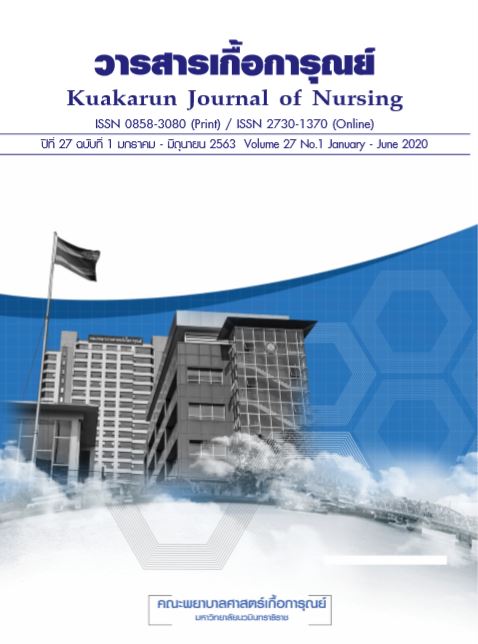การป้องกันและการจัดการกับภาวะสับสนเฉียบพลันในผู้สูงอายุที่รับการรักษาในโรงพยาบาล
คำสำคัญ:
ภาวะสับสนเฉียบพลัน, ผู้สูงอายุ, การป้องกันและการจัดการ, ปัจจัยเสี่ยงภาวะสับสนเฉียบพลันบทคัดย่อ
ภาวะสับสนเฉียบพลันเป็นปัญหาที่พบบ่อยในผู้สูงอายุที่เข้ารับการรักษาในโรงพยาบาล ภาวะนี้ทำให้ ความสามารถในการรู้คิดบกพร่องในระยะยาว รวมถึงส่งผลกระทบต่อค่ารักษาพยาบาล ระยะวันนอน โรงพยาบาล และอัตราการตาย แม้อุบัติการณ์ของอัตราการเกิดภาวะสับสนเฉียบพลันในผู้สูงอายุที่เข้ารับ การรักษาในโรงพยาบาลมีเพิ่มขึ้น พยาบาลยังคงให้ความสนใจและความสำคัญน้อย รวมทั้งการพร่องความรู้ เกี่ยวกับภาวะสับสนเฉียบพลัน อย่างไรก็ตาม หากพยาบาลมีความรู้ความเข้าใจเกี่ยวกับภาวะนี้ทำให้สามารถ ประเมิน ค้นหาปัจจัยเสี่ยงที่ทำให้เกิดได้ตั้งแต่ผู้ป่วยเริ่มมีอาการ รวมถึงสามารถให้การพยาบาลโดยการป้องกัน และจัดการกับภาวะสับสนเฉียบพลันในผู้สูงอายุที่เข้ารับการรักษาในโรงพยาบาลได้ ผู้สูงอายุก็จะมีความรู้คิด ดีขึ้น ลดระยะเวลาในการนอนโรงพยาบาลและการใช้ยาในการรักษา นอกจากนี้ การป้องกันและการจัดการ ยังสามารถลดอุบัติการณ์และภาวะแทรกซ้อนจากการเกิดภาวะสับสนเฉียบพลันในผู้สูงอายุได้ อีกทั้งยังเป็น ข้อมูลพื้นฐานในการสร้างโปรแกรมการป้องกันและการจัดการกับเกิดภาวะสับสนเฉียบพลันในผู้สูงอายุ ที่เข้ารับการรักษาในโรงพยาบาล เพื่อลดเหตุการณ์ไม่พึงประสงค์และคงไว้ซึ่งความสามารถในการรู้คิดที่ดี ของผู้สูงอายุ
เอกสารอ้างอิง
Johansson YA, Bergh I, Ericsson I, Sarenmalm EK. Delirium in older hospitalized patients-signs and actions: a retrospective patient record review. BMC Geriatrics 2018;18(1):43.
Marcantonio ER. Delirium in hospitalized older adults. The New England Journal of Medicine 2017;377(15):1456-66.
Inouye SK, Westendorp RG, Saczynski JS. Delirium in elderly people. The Lancet 2014;383(9920):911-22.
Nguyen PV, Pelletier L, Payot I, Latour J. The delirium drug scale is associated to delirium incidence in the emergency department. International Psychogeriatrics 2018;30(4):503-10.
Smithburger PL, Korenoski AS, Alexander SA, Kane-Gill SL. Perceptions of families of intensive care unit patients regarding involvement in delirium-prevention activities: a qualitative study. Critical Care Nurse 2017;37(6):e1-e9.
Guthrie PF, Rayborn S, Butcher HK. Evidence-based practice guideline: delirium. The Journal of Gerontological Nursing 2018;44(2):14-24.
Ngamkala T, Malathum P, Krairit O. Incidence and risk factors of acute confusional state in hospitalized older patients. Ramathibodi Nursing Journal 2018;24(2):137-49. (in Thai)
Avelino-Silva TJ, Campora F, Curiati JA, Jacob-Filho W. Association between delirium superimposed on dementia and mortality in hospitalized older adults: a prospective cohort study. PLOS Medicine 2017;14(3):e1002264.
American Psychiatric Association. Diagnostic and statistical manual of mental disorders (DSM-5®). Arlington (VA): American Psychiatric Association; 2013.
Inouye SK, van Dyck CH, Alessi CA, Balkin S, Siegal AP, Horwitz RI. Clarifying confusion: the confusion assessment method. a new method for detection of delirium. Annals of Internal Medicine 1990;113(12):941-8.
Wongpakaran N, Wongpakaran T, Bookamana P, Pinyopornpanish M, Maneeton B, Lerttrakarnnon P, et al. Diagnosing delirium in elderly Thai patients: utilization of the CAM algorithm. BMC Family Practice 2011;12:65.
Rosen J, Sweet RA, Mulsant BH, Rifai AH, Pasternak R, Zubenko GS. The delirium rating scale in a psychogeriatric inpatient setting. The Journal of Neuropsychiatry and Clinical Neurosciences 1994;6(1):30-5.
Zartrungpak S, Prasertchai R, Jennawasin S, Saipanish R. Thai delirium rating scale. Journal of the Psychiatrist Association of Thailand 2000;45(4):325-32. (in Thai)
Sogprasert S, Somboontanont W, Visavajarn P, Siritipakorn P. The effect of a clinical nursing practice guideline on prevention of delirium among hospitalized elderly patients at a university hospital. Journal of Nursing Science 2015;33(1):60-8. (in Thai)
Schuurmans MJ, Shortridge-Baggett LM, Duursma SA. The Delirium observation screening scale: a screening instrument for delirium. Research and Theory for Nursing Practice 2003;17(1):31-50.
Rivosecchi RM, Smithburger PL, Svec S, Campbell S, Kane-Gill SL. Nonpharmacological interventions to prevent delirium: an evidence-based systematic review. Critical Care Nurse 2015;35(1):39-50.
Hshieh TT, Yue J, Oh E, Puelle M, Dowal S, Travison T, et al. Effectiveness of multicomponent nonpharmacological delirium interventions: a meta-analysis. JAMA Internal Medicine 2015;175(4):512-20.
Burton JK, Siddigi N, Teale EA, Barugh A, Sutton AJ. Non-pharmacological interventions for preventing delirium in hospitalised non-ICU patients. Cochrane Database of Systematic Reviews 2019(4):1-12.
Wichian K, Panpanit L. Development of a clinical nursing practice guideline for delirium prevention in older patients admitting in coronary care unit, Khon Kaen Hospital. In: The National and International Graduate Research Conference; 2017 Mar 10; Khon Kaen, Thailand. (in Thai)
Faustino TN, Pedreira LC, Freitas YS, Silva RM, Amaral JB. Prevention and monitoring of delirium in older adults: an educational intervention. Revista Brasileira de Enfermagem 2016;69(4):725-32.
Boockvar KS, Teresi JA, Inouye SK. Preliminary data: an adapted hospital elder life program to prevent delirium and reduce complications of acute illness in long-term care delivered by certified nursing assistants. Journal of the American Geriatrics Society 2016;64(5):1108-13.
Bunn D, Jimoh F, Wilsher SH, Hooper L. Increasing fluid intake and reducing dehydration risk in older people living in long-term care: a systematic review. Journal of the American Medical Directors Association 2015;16(2):101-13.
Chatchawn N, Untaja P, Yuroong A. The nurses role in delirium management in older persons. Journal of The Royal Thai Army Nurses 2018;19(2):103-10. (in Thai)
Ferguson E, Mossey S. Non-pharmacological prevention of delirium in older adults living in long-term care homes: a scoping review of nursing interventions. Perspectives 2018;40(2):19-27.
Layne T, Haas SA, Davidson JE, Klopp A. Postoperative delirium prevention in the older adult: an evidence-based process improvement project. MEDSURG Nursing 2015;24(4):256-63.
Otremba I, Wilczynski K, Szewieczek J. Delirium in the geriatric unit: proton-pump inhibitors and other risk factors. Clinical Interventions in Aging 2016;11:397-405.
Inouye S, Robinson T, Blaum C, Busby-Whitehead J, Boustani M, Chalian A, et al. American Geriatrics Society abstracted clinical practice guideline for postoperative delirium in older adults. Journal of the American Geriatrics Society 2015;63:142-50.
Cohen C, Pereira F, Kampel T, Belanger L. Understanding the integration of family caregivers in delirium prevention care for hospitalized older adults: a case study protocol. Journal of Advanced Nursing 2019;75(8):1782-91.
Hshieh TT, Yue J, Oh E, Puelle M, Dowal S, Travison T, et al. Effectiveness of multicomponent nonpharmacological delirium interventions: a meta-analysis. JAMA Internal Medicine 2015;175(4):512-20.

















